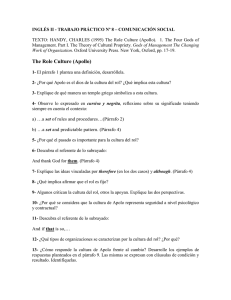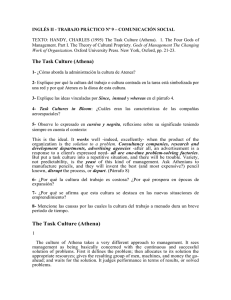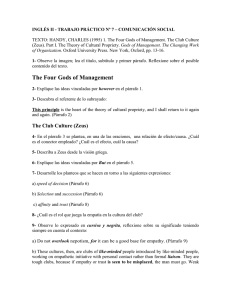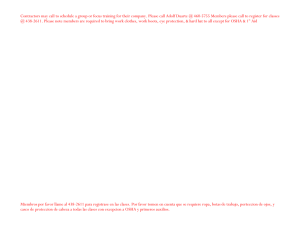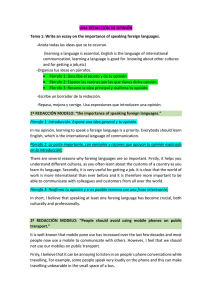INGLÉS II - TRABAJO PRÁCTICO Nº 10 – COMUNICACIÓN
Anuncio
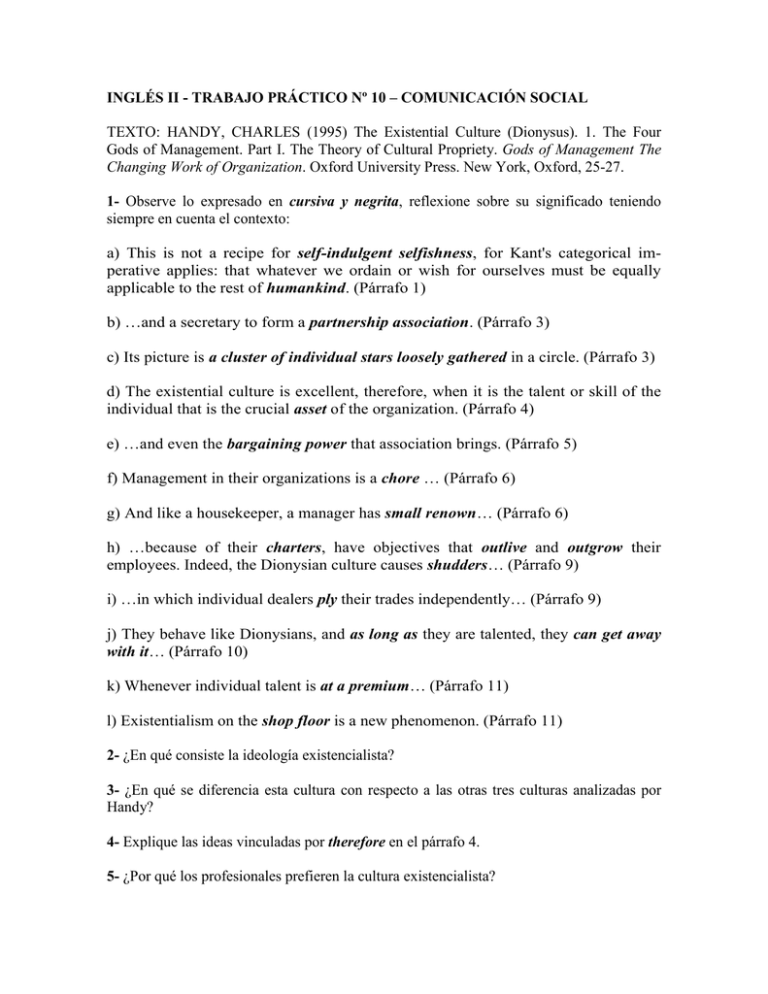
INGLÉS II - TRABAJO PRÁCTICO Nº 10 – COMUNICACIÓN SOCIAL TEXTO: HANDY, CHARLES (1995) The Existential Culture (Dionysus). 1. The Four Gods of Management. Part I. The Theory of Cultural Propriety. Gods of Management The Changing Work of Organization. Oxford University Press. New York, Oxford, 25-27. 1- Observe lo expresado en cursiva y negrita, reflexione sobre su significado teniendo siempre en cuenta el contexto: a) This is not a recipe for self-indulgent selfishness, for Kant's categorical imperative applies: that whatever we ordain or wish for ourselves must be equally applicable to the rest of humankind. (Párrafo 1) b) …and a secretary to form a partnership association. (Párrafo 3) c) Its picture is a cluster of individual stars loosely gathered in a circle. (Párrafo 3) d) The existential culture is excellent, therefore, when it is the talent or skill of the individual that is the crucial asset of the organization. (Párrafo 4) e) …and even the bargaining power that association brings. (Párrafo 5) f) Management in their organizations is a chore … (Párrafo 6) g) And like a housekeeper, a manager has small renown… (Párrafo 6) h) …because of their charters, have objectives that outlive and outgrow their employees. Indeed, the Dionysian culture causes shudders… (Párrafo 9) i) …in which individual dealers ply their trades independently… (Párrafo 9) j) They behave like Dionysians, and as long as they are talented, they can get away with it… (Párrafo 10) k) Whenever individual talent is at a premium… (Párrafo 11) l) Existentialism on the shop floor is a new phenomenon. (Párrafo 11) 2- ¿En qué consiste la ideología existencialista? 3- ¿En qué se diferencia esta cultura con respecto a las otras tres culturas analizadas por Handy? 4- Explique las ideas vinculadas por therefore en el párrafo 4. 5- ¿Por qué los profesionales prefieren la cultura existencialista? 6- ¿Cuál es el rol de administrador en este tipo de cultura? 7- Descubra el referente de lo subrayado: This is marvelous for them,…(Párrafo 7) 8- El autor describe su experiencia laboral en una universidad. Elabore una lista con los rasgos de este ámbito caracterizado por la cultura existencialista. 9- Explique las ideas vinculadas por Indeed en el párrafo 9. 10- ¿Qué ocurre cuando se administra exclusivamente mediante consentimiento? 11- Explique las ideas vinculadas por el primer so que aparece en el párrafo 10 y por not just..but…also en el mismo párrafo. 12- ¿Cuáles son las características de los “nuevos profesionales”? 13- Explique las ideas vinculadas por But en el párrafo 11. The Existential Culture (Dionysus) 1 Dionysus, god of wine and song, presides over this culture because he, if anyone, represents the existential ideology among the gods. Existentialism starts from the assumption that the world is not some part of a higher purpose; we are not simply instruments of some god. Instead, although the fact that we exist at all is an accident, if anyone is responsible for us and our world, it is ourselves. We are in charge of our own destinies. This is not a recipe for self-indulgent selfishness, for Kant's categorical imperative applies: that whatever we ordain or wish for ourselves must be equally applicable to the rest of humankind. Wine and orgies won't work unless someone makes the wine, and that someone must potentially include us. 2 The organizational implications of existential thinking are great. In the other three cultures, the individual is subordinate to the organization: The style of the relationship may vary, but the individual is there to help the organization achieve its purpose and is paid in one way or another by the organization for doing that. In this fourth existential culture, the organization exists to help the individual achieve his purpose. 3 How does this happen? Well, think of doctors: four of them, each an individual with his own speciality but who agree to share an office, a telephone, and a secretary to form a partnership association. Or think of architects or lawyers, or a cooperative of artists. Theirs is a communal culture, existing only for its participants. Its picture is a cluster of individual stars loosely gathered in a circle. But the picture will remain essentially unchanged even if a star or two departs. The stars are not mutually interdependent. 4 The existential culture is excellent, therefore, when it is the talent or skill of the individual that is the crucial asset of the organization. 5 This is the culture preferred by professionals. They can preserve their own identity and their own freedom, feeling owned by no one. And yet they can be part of an organization, with the colleagues, the support, and the added flexibility, and even the bargaining power that association brings. 6 Dionysians recognize no "boss," although they may accept coordination for their own long-term convenience. Management in their organizations is a chore, something that has to be done like housekeeping. And like a housekeeper, a manager has small renown: An administrator among the prima donnas is at the bottom of the status lists. 7 Dionysian cultures are splendid places to work in. I have worked in one myself -a university. Professionals usually have job security, agreed fee scales, allocated territories or spheres of influence, and guarantees of independence. This is marvelous for them, but not for those who have to lead or organize or manage such people. 8 For there are no sanctions that can be used on them. Dismissal, money, perks, or punishment all are outside the jurisdiction of the leader. Even promotion or selection decisions are made, as a rule, by groups of equals. Professionals do not willingly take orders, fill in forms, or compromise on their own plans. Every teacher likes to be the uninterrupted king in his own classroom, just as every doctor is the god of his consulting room. You enter by invitation only, criticize on request, and command by consent. For these are the organizations of consent, in which the manager governs with the consent of the governed and not with the delegated authority of the owners. It may be democracy, but it is very difficult and exhausting to deal with such a culture. 9 One would not expect to find many such organizations around, certainly not in business or industry, where organizations, because of their charters, have objectives that outlive and outgrow their employees. Indeed, the Dionysian culture causes shudders in the ordinary organization or manager, precisely because of the lack of mandated control. When you can manage only by consent, every individual has the right of veto, and so any coordinated effort becomes a matter of endless negotiation. Only when every person can do what he wants, and could in fact operate without the organization at all, are there fewer problems. Antique hypermarkets, in which individual dealers ply their trades independently, although under one roof -a marketing cooperative for independent growers or craftsmen- can usually be managed (though they would not use the word) without too much difficulty. There would be few conflicting objectives, few needs to compromise individual desires for a common good. 10 Organizations, however, put the common good before the individual need, and so they tend to try to translate Dionysians into Athenians, the existential into the task culture. They are, of course, right, as judged by their own interests, to try to do so. Individuals, however, like the notions of individuality and personal professionalism that reside in the Dionysian idea. There is a growing band of "new professionals" individuals who define themselves according to their trade, not just doctors and lawyers, but now also the "systems analyst," "research scientist," "public relations adviser," and "consultant." These people see themselves as independent professionals who have temporarily lent their talents to an organization. They are often young and usually talented and can command an open market salary and reputation. They behave like Dionysians, and as long as they are talented, they can get away with it, for the organization needs them enough to manage them on the terms of their consent. Increasingly, therefore, the specialist groups and any research or development activities are acquiring an existential flavor. 11 Whenever individual talent is at a premium, the Dionysian flavor is probably necessary, and organizations do well to recognize it and accommodate it. But the cult of Dionysus is growing and is no longer related to individual talent. We all would like the benefits of existentialism without its responsibilities and risks. Existentialism on the shop floor is a new phenomenon. We shall return to this in the second part of this book.

